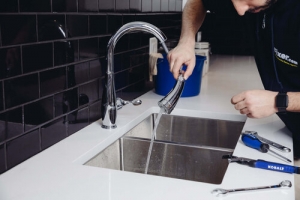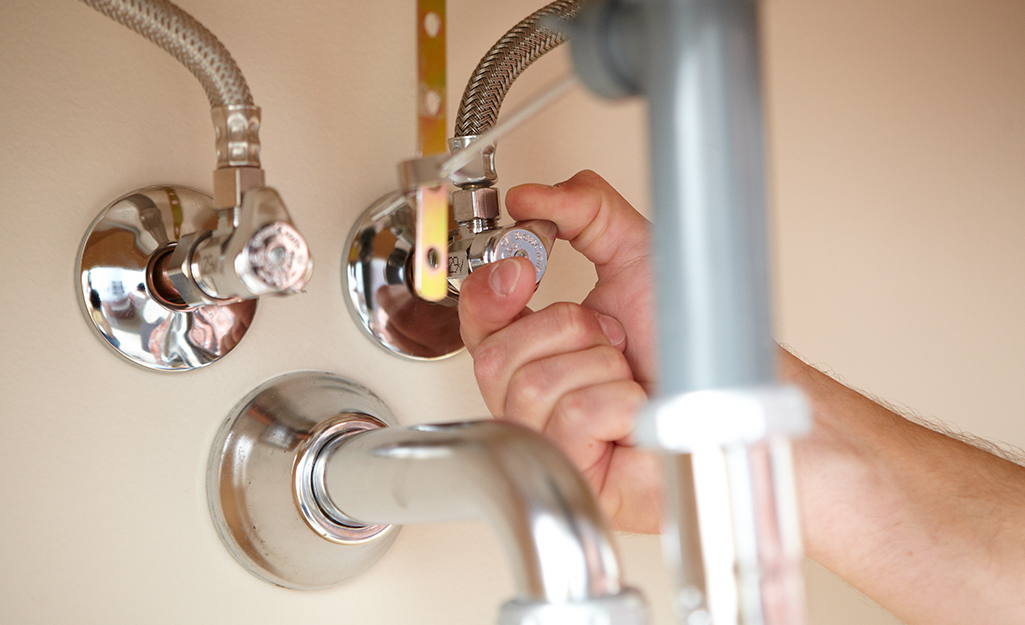Your Merits of Repairing a Faulty Faucet
Your Merits of Repairing a Faulty Faucet
Blog Article
The publisher is making a number of great points about Should I Repair or Replace a Leaky Faucet? in general in this content in the next paragraphs.

Dripping taps could look like a small inconvenience, however their influence goes beyond just the nuisance of the noise. From drainage to sustaining unneeded financial costs and health and wellness dangers, overlooking a dripping faucet can result in different repercussions. In this post, we'll delve into why it's essential to address this common household issue promptly and effectively.
Wastage of Water
Environmental Influence
Trickling taps contribute considerably to water wastage. According to the Epa (EPA), a solitary tap leaking at one drip per second can throw away more than 3,000 gallons of water each year. This not only pressures water sources but likewise affects ecological communities and wildlife based on them.
Step-by-Step Guide to Dealing With a Dripping Faucet
Tools Called for
Before attempting to repair a leaking faucet, collect the necessary tools, consisting of a flexible wrench, screwdrivers, substitute parts (such as washing machines or cartridges), and plumber's tape.
Common Faucet Issues and Their Solutions
Determine the kind of tap and the details concern causing the drip. Common problems include worn-out washers, corroded valve seats, or malfunctioning O-rings. Describe manufacturer guidelines or on-line tutorials for step-by-step advice on fixings.
Financial Costs
Increased Water Bills
Beyond the environmental impact, leaking faucets can blow up water bills considerably. The accumulated waste with time equates into greater energy costs, which might have been avoided with prompt repair services.
Prospective Building Damage
Moreover, long term trickling can cause harm to fixtures and surface areas bordering the faucet. Water buildup can trigger discoloration, rust, and even structural concerns if left ignored, causing extra fixing expenses.
Health Worries
Mold And Mildew and Mildew Growth
The consistent presence of wetness from a trickling faucet creates an excellent environment for mold and mildew development. These fungis not only jeopardize indoor air high quality yet additionally pose health risks, especially for individuals with breathing conditions or allergies.
Waterborne Diseases
Stagnant water in dripping faucets can end up being a breeding ground for bacteria and other virus, raising the threat of waterborne illness. Pollutants such as Legionella bacteria thrive in stationary water, possibly causing major illnesses when consumed or inhaled.
Do it yourself vs. Specialist Repair service
Advantages and disadvantages of DIY Fixing
While some may try to repair a trickling faucet themselves, do it yourself repair work feature their own collection of difficulties. Without correct knowledge and devices, DIY efforts can exacerbate the problem or lead to incomplete fixings, prolonging the issue.
Advantages of Hiring an Expert Plumber
Working with a professional plumber guarantees that the underlying root cause of the trickling tap is addressed efficiently. Plumbers possess the proficiency and tools to diagnose and fix tap issues effectively, saving time and lessening the threat of more damages.
Ecological Responsibility
Individual Payment to Preservation
Taking obligation for fixing dripping faucets aligns with wider initiatives towards water preservation and ecological sustainability. Every person's activities collectively make a significant impact on maintaining valuable resources.
Lasting Living Practices
By focusing on prompt repair services and adopting water-saving routines, individuals add to lasting living practices that profit both existing and future generations.
Safety nets
Routine Maintenance Tips
To stop dripping taps, carry out regular maintenance such as cleansing aerators, examining for leakages, and replacing damaged parts immediately. Additionally, think about mounting water-saving devices or upgrading to extra efficient fixtures.
Value of Prompt Repairs
Attending to trickling taps as soon as they're discovered stops more water wastage and potential damage, eventually saving both water and money in the long run.
Impact on Building Worth
Assumption of Well-Maintained Property
Maintaining a home in good condition, including dealing with maintenance issues like trickling taps, improves its viewed value and worth amongst prospective buyers or renters.
Influence on Resale Worth
Qualities with well-kept plumbing fixtures, consisting of faucets, command greater resale worths in the real estate market. Resolving leaking taps can add to a positive perception during building assessments and negotiations.
Verdict
Addressing a trickling faucet exceeds plain benefit; it's a crucial step towards preserving water, decreasing monetary prices, and safeguarding health and wellness and building. Whether through do it yourself fixings or professional support, acting to take care of trickling taps is a tiny yet impactful means to promote responsible stewardship of resources and add to a much healthier, much more sustainable future.
How to Fix a Leaky Faucet: Step-by-Step Repair Guide
A leaky faucet may seem like a simple annoyance, but if it's not fixed promptly, that leak could cost hundreds to potentially thousands. From water damage to mold, mildew, and high water bills, even a tiny leak can be catastrophic if left unattended. Damage like this can even affect the overall value of your home, so it's important to take the right approach for leaky faucet repair. You may need the help of a plumber in some cases, but we've got a few tips you can try on how to fix a leaky faucet before calling the pros.
Four Faucet Types
When you're learning how to fix a leaky faucet, the first step is knowing what kind of faucet you're working with! There are four common types.
Cartridge Faucets
Cartridge faucets come in one- or two-handled varieties. In one-handled cartridge faucets, hot and cold water combines in a single cartridge. In the two-handled versions, hot and cold water are controlled separately and mixed in the faucet.
Ball Faucets
Ball faucets have a single lever you push up and down to adjust the pressure and rotate to change the temperature. A slotted metal ball controls the amount of water allowed into the spout.
Compression Washer Faucets
They're the oldest type of faucet, but they're still used in many homes — especially older ones. Compression faucets have two separate handles that, when turned, raise or lower the washer that seals a water valve. This valve stops water from flowing through the faucet when it is turned off.
Disc Faucets
Disc faucets rarely need to be repaired due to their maintenance-free design. The water flow is controlled by two discs — the upper one raises and lowers against a fixed lower disc, creating a watertight seal. If your disc faucet starts leaking, you may need to replace the seals or clean residue buildup from the inlets.
Fixing a Leaky Faucet
Step 1: Turn Off the Water
Whether you're learning how to fix a leaky bathtub faucet or how to fix a leaky kitchen faucet, always turn off the water supply to your working area when you're fixing a leak. The last thing you want is a flood added to your list of things to fix.
Look for the shutoff valves below your sink or around the tub and turn them clockwise to stop the water flow. If your faucet doesn't have shutoff valves, you may need to turn off the water for the whole house. Check to make sure it's off by turning the faucet on. If nothing comes out, you're ready to start the repair.
Step 2: Take Apart the Faucet
How you disassemble your faucet depends on the type of fixture you have. You can use a flathead screwdriver to remove the caps on top of the handle or handles for cartridge and compression faucets. Inside, you should see handle screws. Unscrew these with a screwdriver to remove the handle.
Disc- and ball-style faucets will typically have an inlet screw near the handle, and removing that will reveal the interior of the faucet.
Detach the Valve Stem
For cartridge- and compression-style faucets, you'll see the inner valve stem or cartridge once you remove the faucet handles. If you have a compression faucet, unscrew the brass valve stem. If you have a cartridge faucet, pull out the cartridge. If your cartridge has been in place for a while, it may require some tools or extra force to remove it due to mineral deposits.
Examine and Replace Parts
Once you've removed the parts, check them out to confirm what needs to be replaced. You may see corroded rubber washers, O-rings, stems, or cartridges. On a ball-style faucet, check the seats and springs for damage.
If you need to repair a leaky disc faucet, check the inlet and seals on the lower disc.
Once you determine what parts must be replaced, visit your local hardware store. Bring the damaged parts with you to ensure you can purchase the correct components to replace them.
Clean Valves and Faucet Cavity
If you've removed a stem or cartridge, you may notice mineral buildup in the faucet's threads. Use white vinegar to clean the valve seat by soaking it for a few minutes, then scrub it away with a soft toothbrush and rinse with warm water. You can also clean the interior of the faucet in the same way.
Reassemble the Faucet
Once your faucet is cleaned and the required parts have been replaced, it's time to reassemble it. Put the pieces back together and slowly turn the water supply back on. Doing this slowly is crucial because too much initial water pressure can damage the new hardware you've just installed.
https://homewarranty.firstam.com/blog/how-to-fix-leaky-faucet

I'm just very excited about How to Fix a Dripping or Leaky Faucet and I hope you appreciated my entry. Sharing is good. Who knows, you may just be doing someone a favor. I am grateful for being here. Don't hesitate to stop by our site back soon.
Report this page